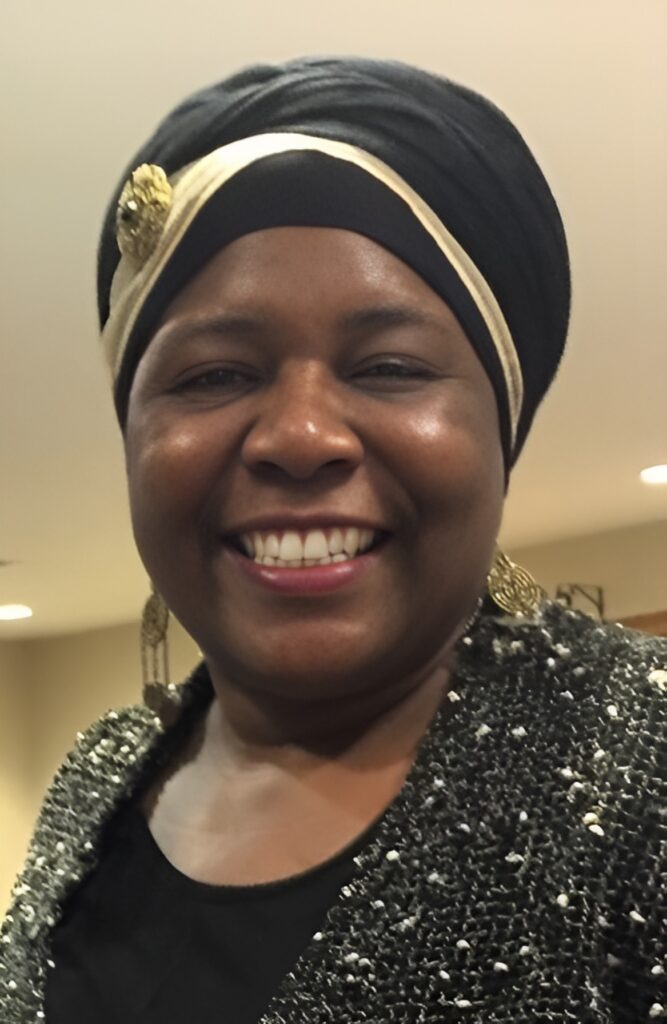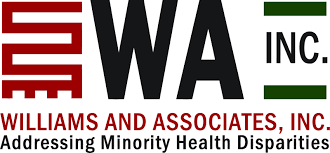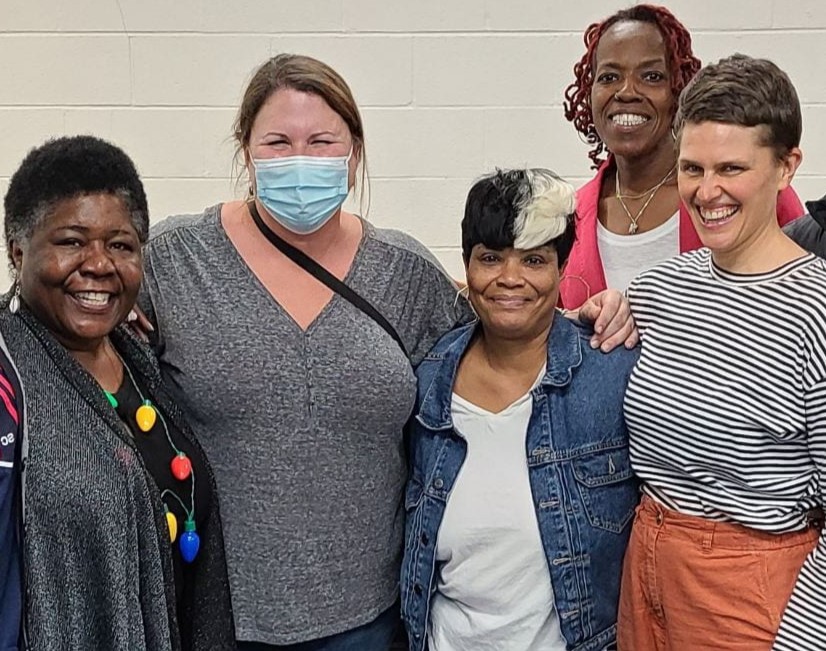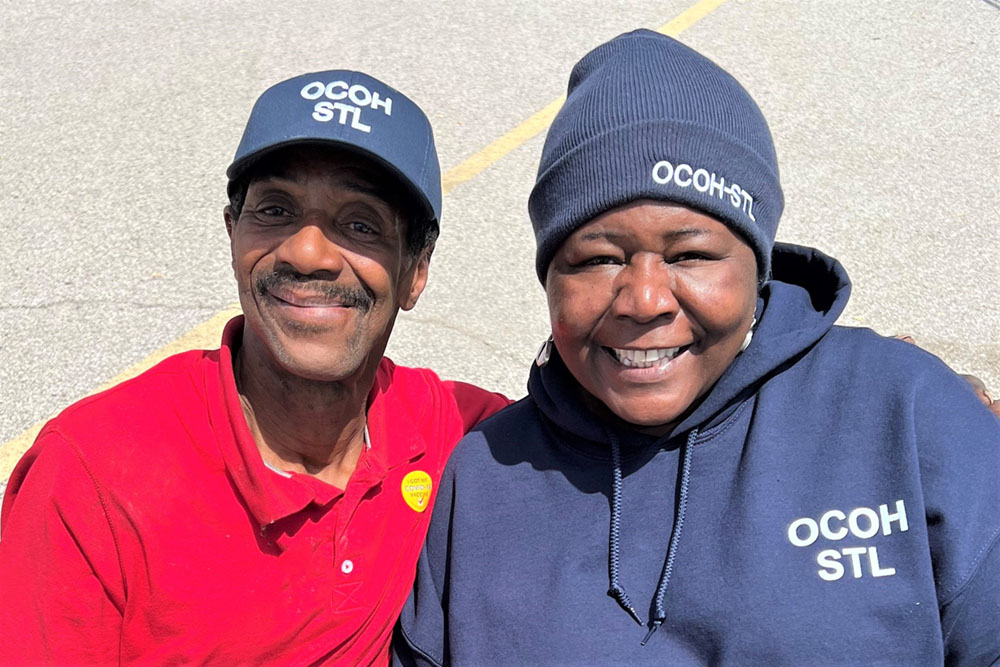
Joan F. was born in St. Louis, but summers with family in the deep south taught her how to strike up a conversation with just about anyone. This skill—along with her kind eyes and big smile—have been essential to her work helping underserved and marginalized communities in St. Louis. From the early years of the HIV epidemic to today, Joan has seized opportunities to listen, learn and do more.
Turning on her activist switch
In the late 1980s, Joan started as an intern with the Riverfront Times weekly newspaper tabulating Best of St. Louis poll numbers. Editor Ray Hartmann believed in giving people a chance and moved her to a part-time receptionist role, and eventually to a full-time position writing articles about the music scene. She enjoyed the perk of going to nightclubs and concerts.
At the same time, the HIV epidemic was decimating the gay community. Those who had contracted HIV and developed AIDS had a very low survival rate, and were often feared and ostracized. Joan remembers a colleague and friend who told her he was HIV positive. He left St. Louis to spend his final days with his grandmother, whom she says never accepted him as the proud, gay, Black man she knew. She couldn’t understand why he would leave friends who would care for him. She wanted to do something more.
Joan decided to take an American Red Cross course on HIV prevention, which she says was culturally competent regarding African Americans. “Taking that course changed my life,” she says. She took the course to become a trainer and soon began to train other trainers nationally on HIV prevention. She says of the experience, “it turned on my activist switch.”

Joan began volunteering with Williams & Associates, Inc., a community-based public health agency addressing minority health disparities and health equity. She says she got the best education there and eventually became a paid employee. “They were intent on making sure your skill set improved,” she says.
She went to trainings from the Centers for Disease Control and Prevention (CDC) and, true to form, became a trainer, initially for women living with HIV and later for interventions for men who have sex with men. She points out “men who have sex with men” is a term the CDC uses, but many African American men today use “same-gender loving” to focus on the relationship and not just on sexual activity.
In the early years of the HIV epidemic, Joan says media outlets mostly featured gay white men dying of AIDS and being activists for change, but she was seeing Black men and women die. “We weren’t being shown as anything else except the people who were dying and getting this disease,” she says. “We weren’t being shown as activists, as church leaders, as community leaders…” She remembers how closeted Black men, who had married to avoid being stigmatized for being gay, were now demonized for putting women at risk.
Eventually, Black celebrities started being forthcoming of their HIV positive status. Magic Johnson and Arthur Ashe spoke out for understanding, treatments were developed, and visibility improved. Still, she wanted to do more in the community.
CHW, CHW-C, and CRFT
In 2021, Joan decided to take courses to become a Community Health Worker (CHW), a trusted member of the community who educates and connect peers to health and social resources. CHWs had long been essential members of healthcare teams in some countries before the United States began using the term in the 1970s. By the late 1990s, CHWs were formalized as a cost-effective way to deal with rising medical costs.
Joan asks, “Who knows the community better than people from the community?” But, she points out, there’s a difference between being “known” and being “known and trusted” in a community—neighbors may be known for gossip and spreading misinformation. Joan says many CHWs have had personal trauma or have thrived after difficult transitions that can be relatable to those coming out of foster care, addiction, or prison. She says,
The gift I have to connect with people, and make them feel okay as they are in that moment—you can’t teach that in school.
Joan
Joan says her CHW courses reignited her love for learning. Courses introduced students to health disparities in communities and services available at various organizations. CHWs are required to intern 60 hours at a community organization that provides medical or social services. She explains, “You say you want to do this work in the community, but if you’re scared to go into the community, you can’t do the work.”

CHW training gave Joan a sense of the many roles she can fill as a CHW—working at a hospital, federally qualified health center, or community-based organization—and many ways she can help her community.
Joan added another initial when she became a CHW-C, or CHW-Certified. In Missouri, a CHW-C must have a high school diploma or equivalent, complete the CHW standard training program, not be listed on disqualifying registries, and not have been convicted or have plead guilty to felonies or crimes against minors. Joan says a CHW-C will get more opportunities because they’ve been vetted.
Last year, Joan graduated from the Community Research Fellows Training Program (CRFT) at Washington University in St. Louis, a 17-week public health research training course for community members to gain the tools to examine and address health disparities. Joan says while the CHW program helped her understand the ways she can help her community, the CRFT program showed her how to find research data to help get grant funding for potential solutions.
“Reiki turnt up”
Joan recently completed her level 2 certification in Reiki, a Japanese therapy involving the hovering of hands over, or the laying of hands on, the body to encourage the healthy flow of energy to reduce stress and promote healing.
Reiki focuses on seven major energy points, called chakras, which run along the spine and are viewed as energy wheels. Each chakra has a name, color, location on the spine, and a health focus. “When that energy gets stagnant, it gets stuck in the body,” Joan says, and it can manifest as dis-ease, such as anxiety or depression, or as disease, when the body is not working at its optimum.
Clients lie down on a massage table in a room with natural sounds and subdued lighting. Joan also uses aromatherapy through burning incense and applying essential oils to calm clients.
Joan calls her sessions “Reiki turnt up,” explaining, “Even though Reiki is a Japanese modality, I’m not. I am a Black woman of African descent living here in these United States. What my people may need may be a little different.”
Joan adds affirmations to her therapy. While having her hand on the heart chakra, she may have the client repeat the mantra “I love myself. I forgive myself. I forgive others.”
After treatment, she asks each client to write down three adjectives to describe how they feel. The responses have included “calm,” “happy,” “forgiveness,” and “uncluttered.”
Joan has been amazed by the reactions. “You can literally feel people release a sense of weight,” she says. She has seen people with dementia, who were initially agitated, completely relax.

She adds, “Touch is essential to the body,” recalling the first year of the COVID-19 pandemic and the loss of touch and the separation people experienced.She wants to provide that platonic touch for the person living with HIV, who may not be touched out of fear of contracting the disease, or for the senior who may only experience touch from a nurse.
She says it’s unfortunate that Black children older than 7 or 8 years old are often told they are “too big for hugs.” By the time they are young men and women, she says they may only be touched by the opposite gender in terms of sex. She says men are starving for that touch.
Joan provides Reiki therapy as a service for Williams & Associates male-focused grants. She says men are taught to hide their vulnerability. “Just for a man to lay in a prone position on a massage table, and to have someone touch their heart, touch their throat, touch their crown, for no other reason than you deserve to be healed,” she says.
Joan says helping others helps her heal. “My father was the best father he could be, having seen examples of what fatherhood was for him. Often we’re taught ‘what goes on in this house, stays in this house,’ but that’s where the lies and trauma hide.”
She says her mother always taught her to give, to know that there were people in the world who didn’t have what she has, and not to depend on other people. “In my mind, I’ve never had that sense of lack or that it would never be enough for me,” she says.
Joan doesn’t plan to slow down anytime soon, although she is eying the Mississippi gulf and sunshine for her eventual retirement.
“I feel as long as I am here on Earth and breathing,” she says, “there’s always something new to learn and there’s always someone to share that new learning with.”
Joan has worked with the Our Community Our Health-St. Louis program since Feb 2022. She is now employed as a full-time Community Project Manager with Dr. Hilary Reno’s team.
Links to learn more:
- CDC article on HIV and Black/African American People in the U.S.
- Community Health Worker training programs in Missouri.
- CDC brief on “Addressing Chronic Disease through Community Health Workers”